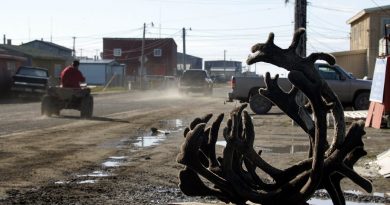Alaska senators seek 5-year Buy America waiver for Indigenous communities

Alaska’s two senators are advocating for a five-year exemption for Indigenous communities from legislation that requires prioritizing American-made products in infrastructure projects funded by the federal government.
“I generally support efforts to buy and hire American when administering federal resources, but those rules must account for remote communities with extremely limited workforces and strained supply chains, while abiding by the federal government’s trust responsibility to indigenous Americans,” Senator Dan Sullivan (R-AK) said in a statement.
“Without a waiver, these one-size-fits-all requirements will prolong delays and hike costs for tribes and communities that simply can’t afford either.”
Like in northern Canada, Alaskan Indigenous communities face massive infrastructure challenges.
Many are remote, fly-in communities and face constant supply chain and workforce challenges due to their remote locations.

The time and distance and frequent interruption of getting equipment and workers to the Arctic also increases costs exponentially.
“Native communities – particularly those in Alaska – face incredible challenges when it comes to improving and developing infrastructure, especially when it comes to safe, affordable housing. Alaska’s barging and building seasons are shorter, the price of supplies are higher, geography is more vast, and securing a work force is often more challenging,” Senator Lisa Murkowski (R-AK) said.
“Driven by feedback from Tribal leaders, I’m calling on OMB to ensure that waivers are in place to provide the greatest opportunity for Tribal flexibility during the implementation of the BABA Act.”
Act’s goal to boost domestic manufacturing
The Biden administration initiated the Build America, Buy America (BABA) Act to promote domestic manufacturing and modernize the country’s infrastructure.
The act is part of the Infrastructure Investment and Jobs Act, which was signed into law in 2021.
Gabe Layman, the president and CEO of the Cook Inlet Housing Authority, an organization that works on affordable housing initiatives, expressed support for strengthening American manufacturing, but said Indigenous groups require additional time to prepare for BABA’s implementation due to an already overwhelming demand for affordable housing that has already overtaken the economy’s capacity to supply necessary construction materials.
“Without this waiver, cost increases from supply shortages and a fundamental inability to source materials will delay critically needed housing for elders, children, and families in Tribal communities, where families are seven times more likely to live in overcrowded conditions and five times more likely to have inadequate plumbing, kitchen, or heating systems,” the organization said.
“Rushing to implement BABA in a manner that jeopardizes or delays new housing in Tribal communities would be short-sighted and counterproductive.”
Comments, tips or story ideas? Contact Eilís at eilis.quinn(at)cbc.ca
Related stories from around the North:
Canada: The challenges of construction in the North-Spotlight on Nunavik, Eye on the Arctic
rway: Thawing permafrost melts ground under homes and around Global Seed Vault in Svalbard, The Independent Barents Observer
Russia: City in Arctic Russia cooling ground to preserve buildings on thawing permafrost, The Independent Barents Observer
United States: 30–50% of critical northern infrastructure could be at high risk by 2050 due to warming, says study, Eye on the Arctic



